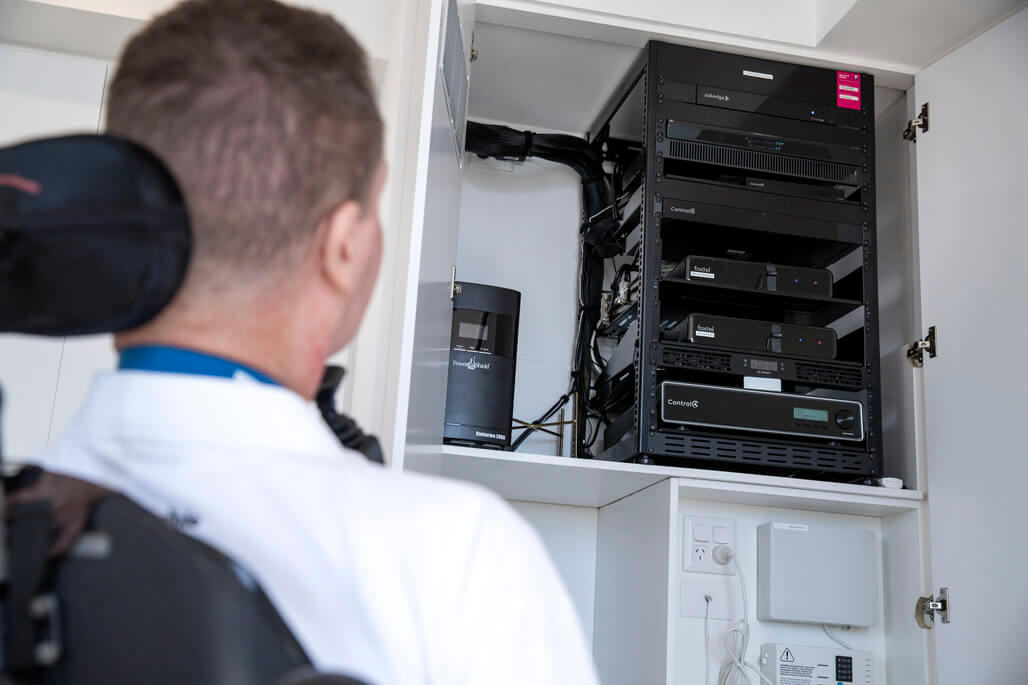When I was injured 28 years ago and became a C2 ventilated quadriplegic, there was the bare minimum of personal technology available. Mobile phones were nothing like they are today and Siri simply didn’t exist. We’ve come a long way from that era to today, where most aspects of life are more or less controlled by some sort of device. And the independence and privacy that has been afforded to me through assistive technology have been truly life-changing.
People don’t realise, back in the old days, when you wanted to do something, anything — someone else had to do it for you. Previously, my carers sent all my emails, now I am in control of my communications and send all my emails.
There are other features, like being able to control the doors in your own home, that make a huge impact on day-to-day life. Being able to go to my room and use voice-activated commands to close the door behind me and have private conversations on the phone — I had never been able to experience this sort of thing before living in a fully accessible, smart home.
Assistive technology is what has allowed people with disability privacy and independence. All those basic human rights that everyone wishes for can now be provided to all Australians because of the changes in tech. It’s been amazing.
My Accessible Homes Australia Specialist Disability Accommodation apartment in Broadbeach, Gold Coast, uses Cat6 Ethernet Network Cabling, which is a much more reliable system than WiFi. Attached to this cabling is a Control4 home automation and smart home control system. My Control4 operates everything from the front door to electronic devices, including air conditioning; lighting; televisions; and window coverings. Anything you can plug into a powerpoint can be operated. It’s a universal system that allows you to operate it with either iOS/Apple devices or Android devices, which is an important feature.
The main way I operate Control4 is through Amazon’s virtual assistant technology, Alexa. I have speaker pods in my house, one in my living area and one in my bedroom, that allows me to control all the features in my home. I can even be out of the house and still activate the system from my mobile phone. It’s important for someone like myself, as I can’t regulate my body temperature. So, if I’m out and about and it’s really hot, I can set the temperature control to cool the house before I get home and avoid sitting in the heat.
What I like best about my smart home is having the freedom to be in control. My support team throughout the day can help with general household duties, like ironing, washing, and preparing meals, while I still have someone support me. But it’s not a person — it’s Siri or Alexa.
The most challenging part of navigating a smart home is getting used to the technology. It can take months to get your head around it. It takes time to get in the habit of repeating the same phrases. It can be off-putting and I understand why able-bodied people may get frustrated when Alexa or Siri don’t get the command right. But if you bear with it, it’s well worth it in the long run. It is truly life-changing to have a house fitted with assistive tech and I can’t put into words how much of a difference it makes when you come from nothing.
Another consideration is power supply; a decent power supply is essential to run a smart home. If your power’s out, you’re down. At AHA, our SDA apartments include emergency backup battery power to provide for communication requirements of tenants.
I don’t have any serious concerns about the data privacy and security of using assistive technology in my home. What I am serious about is supporting product development and improvement — the more I can share the better I can make it for everyone.
Technology is always improving, it’s always adjusting to your voice, it’s getting easier and easier. And I’m excited that in the next 12 months, 24 months, 5 years, the tech is going to get so much better.

